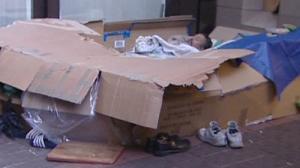Poverty-stricken Europeans voice frustration in Brussels

Too many people in Europe are currently faced with the choice between "heating and eating" according to Fintan Farrell, head of the European Anti-Poverty Network (EAPN). Deirdra O'Regan reports from the People Experiencing Poverty conference in Brussels.
The EAPN, with Irishman Farrell at the helm, is the main driving force behind the annual meeting of People Experiencing Poverty, which opened today in Brussels. The two-day meeting, which is in its ninth year, is primarily intended to encourage and allow people experiencing poverty to influence policy.
This year's conference had special significance as it occurs in the middle of 2010, the European Year for Combating Poverty and Social Exclusion.
The meeting is focussed on identifying priorities and setting the agenda for a ten-year action plan to eliminate poverty across all EU member states. Participants attend workshops to discuss how to raise awareness about poverty within member states. They also discuss how to help shape solutions to problems in the areas of financial inclusion, housing, services, social participation and employment.
Despite the vast wealth of the EU, poverty across the region remains relatively high. Approximately one in seven people in the EU is at risk of poverty; the economic crisis is likely to cause an increase in this figure. The workshops so far have been energetic and productive, but this year's conference is marked with a definite air of frustration and anger; anger that the work done at these yearly meetings is not translating into real change.
Research by the University of Antwerp reveals that while 55% of policy-makers believe that the recommendations of previous conferences have been followed up, a disappointing 78% of delegates experiencing poverty feel such recommendations have had little effect.
The purpose of this conference is to work with people experiencing poverty. But this admirable goal is hampered by a lack of attendance by those with real power in Brussels. There was a notable absence of MEPs and those who attended did so briefly. However, a number of Irish MEPs, including Proinsias De Rossa, were in attendance for some of the workshops.
Many of the delegates who did attend echoed the sentiment of one incensed and frustrated Italian delegate, who said that "if we were bankers and economists there would be more MEPs here...we cannot wait until 2020 in a world where people cannot eat".
Perhaps the fundamental problem with the conference is that both those organising and attending already have a vested interest. Although from diverse and varied backgrounds, they generally agree on what needs to be done. The people who really need to be convinced, the conservative-leaning MEPs who currently constitute the majority of parliament, are conspicuously absent.
Despite this, the delegates are remarkably determined to make their voices heard at a European level. Tomorrow the delegates will present the results of their workshops and their 16 specific priorities for the next ten years.
Politico will have further coverage of the conference, including interviews with the Irish delegation in the coming days.
